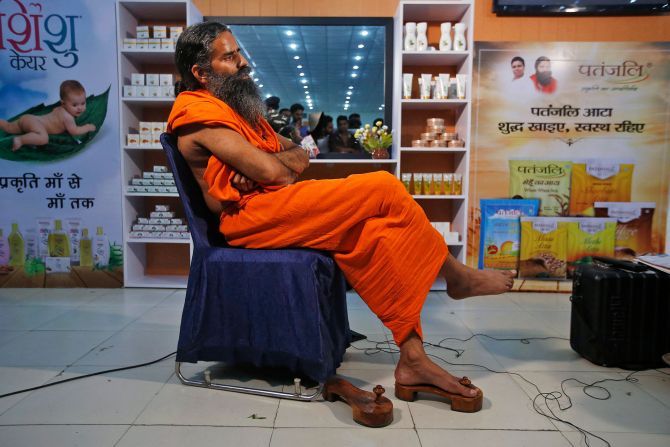Ramdev made nature-to-goodness products popular, and reaped benefits.
Then he seemed to lose focus and the last thing it needs is more distraction, like the passionate founder shooting his mouth off yet again, says Shailesh Dobhal.

A year can be a long time in the consumer expendables business.
Last May, Ramdev, while addressing a packed press conference in Delhi, announced that Patanjali Ayurved, the nature-and-ayurveda products firm he founded, had crossed Rs 100 billion in sales.
It took his firm just seven years to reach that milestone, something that competing fast moving consumer goods or FMCG firms -- from multinationals like Hindustan Unilever to home-grown brands like Amul -- took decades to achieve.
At the same press conference, he also famously announced that Patanjali would cross Rs 200 billion in sales by March 2018. This at a time when other FMCG players were struggling to eke out low single-digit sales growth.
A year down the line, growth seems to be coming back at most FMCG companies, with the leader of the pack HUL clocking 12 per cent revenue growth and 2.2 per cent sales volume growth for 2017-2018.
The Rs 2 trillion-odd FMCG market grew at a healthy 9.1 per cent in volume and 13.5 per cent in value in 2017-18.
However, Ramdev's Patanjali virtually stopped growing in the last year. Why?
Patanjali puts it to supply chain disruptions caused due to demonetisation and the goods and services tax or GST.
"Unlike other years, in 2017-2018 we got only 10 months to do business. This might have a certain impact. The final revenue numbers are still being calculated. But what we can confidently say now is that the 2017-2018 revenue figure will not be less than what it was in 2016-2017," says Patanjali's spokesperson S K Tijarawala.
Demonetisation and GST-led supply disruptions though is just one part of the story.
Students of management may recall the famous quote of Chinese military genius Sun Tzu: 'Your greatest strength can be turned into your greatest weakness.'
Patanjali single-handedly managed to rejuvenate the moribund herbal and ayurvedic category riding on Ramdev's yoga credentials and almost evangelical zeal to push desi aka ayurvedic and herbal products.
A smart distribution strategy that hinged on exclusive and traditional ayurvedic retailers in arogya kendras and chikitsalayas helped cement the brand's ayurvedic origins.
The big distribution push came in a little later and made Patanjali a runaway success.
Competitors first panicked, but soon got their act together.
HUL relaunched its once forgotten ayurvedic brand Ayush and brought focus back to another ayurveda-based one in Indulekha.
Colgate-Palmolive launched a Vedshakti version of its bestseller Colgate toothpaste. Likewise with others.
With all the jostling and fighting, the market expanded, with the natural segment in the personal care products alone at Rs 185 billion, almost 40 per cent of the overall personal care market.
Unfortunately for Patanjali, while competitors were busy meeting the challenge it threw, the firm itself was getting distracted.
Ramdev was blaming competition for even routine product problems faced by most FMCG firms, and making unsubstantiated allegations that MNCs are conspiring against Patanjali!
Its much vaunted distribution structure, standing on the bedrock of thousands of chikitsalayas, too was reportedly beginning to creak.
Patanjali took its eye off its traditional distribution chain in chikitsalayas even as the chemist segment was firing almost three-fold growth for natural personal care products compared to general trade for most FMCG firms.
A recent report from market research firm Nielsen reveals that chemist trade for natural personal care products, the kind Patanjali sells, is growing at over 19 per cent compared to just 6 per cent growth for these products with millions of general, mom-and-pop stores across the country.
Then there are reportedly other fundamental business issues from the new products' time-to-market, to unviable and conflict-ridden distribution formats.
To be sure, none of these problems is insurmountable.
Patanjali sits on a huge brand equity, and at over Rs 100 billion has the scale to leverage suppliers and distributors alike to realign the business.
However, the last thing it needs is more distraction, like the passionate founder shooting his mouth off yet again, as Ramdev did as late as January this year boasting about dislodging the Rs 358 billion HUL from the top slot within a year!
Photograph: Adnan Abidi/Reuters











